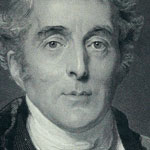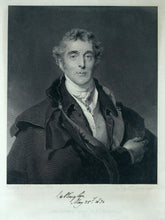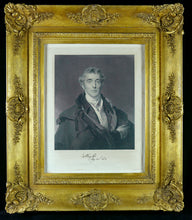Autograph Signed Engraving of Arthur Wellesley, Duke of Wellington K.G., 1830
Adding product to your cart
Overall: 57cm (22.5in) x 48cm (18.75in)
Provenance: Ardgowan House, Inverclyde.
Engraving by William Dean Taylor after Sir Thomas Lawrence, published by Colnaghi, Pall Mall, London. The Duke half-length standing slightly to right, looking to front, his right arm held across his body, wearing cloak over suit with the Order of the Golden Fleece at his neck. Signed and dated in the border 'Wellington / May 25th 1830', 26cm x 22cm. In original gilt wood glazed frame.
Read more
The provenance and autograph inscription suggest the present engraving was given by the Prime Minister, the Duke of Wellington, to independent Member of Parliament, Sir Michael Shaw Stewart, 6th Baronet (1788-1836), of Ardgowan, Renfrewshire and 14 Carlton Terrace, London as a political gift shortly before the general election of 1830 - the election being triggered by the death of George IV on 26 June. Despite being an ‘early friend of Robert Peel at Oxford’, Shaw Stewart had entered Parliament as a Whig in 1827, but was regarded by the Tories in 1830 as one of the ‘good doubtfuls’, who was a friend ‘where not pledged’. He appears to have been a promoter of free trade and a diligent representative of voteless Glasgow workers whose wages, he claimed, were driven down by uncontrolled immigration from Ireland. However as an ‘independent Scotsman’ and a ‘friend of the great measure of reform’ he was later to explain that he had supported Wellington’s ministry in expectation of ‘a reform of some kind’, but had ‘heard with astonishment and dismay’ of the Duke’s anti-reform declaration.






